Module 2 Relationships Unit 6 Family life 课件(共85张PPT)
文档属性
| 名称 | Module 2 Relationships Unit 6 Family life 课件(共85张PPT) |

|
|
| 格式 | pptx | ||
| 文件大小 | 11.5MB | ||
| 资源类型 | 试卷 | ||
| 版本资源 | 牛津沪教版 | ||
| 科目 | 英语 | ||
| 更新时间 | 2023-10-18 14:14:08 | ||
图片预览

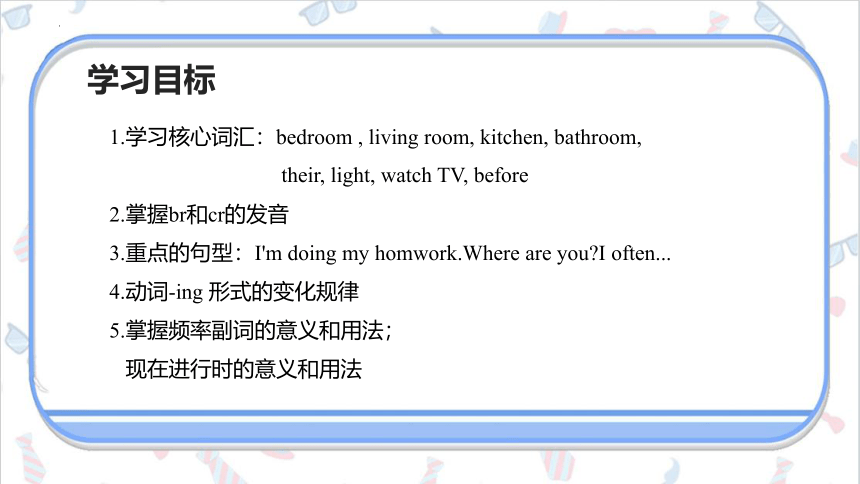
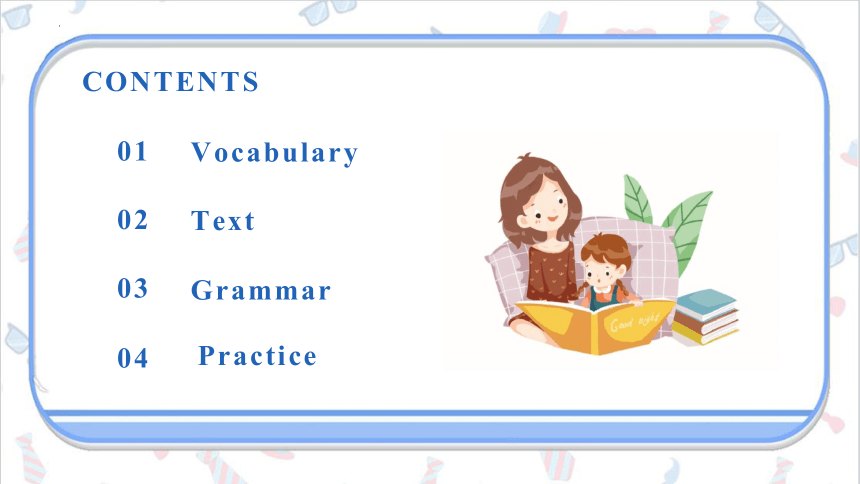
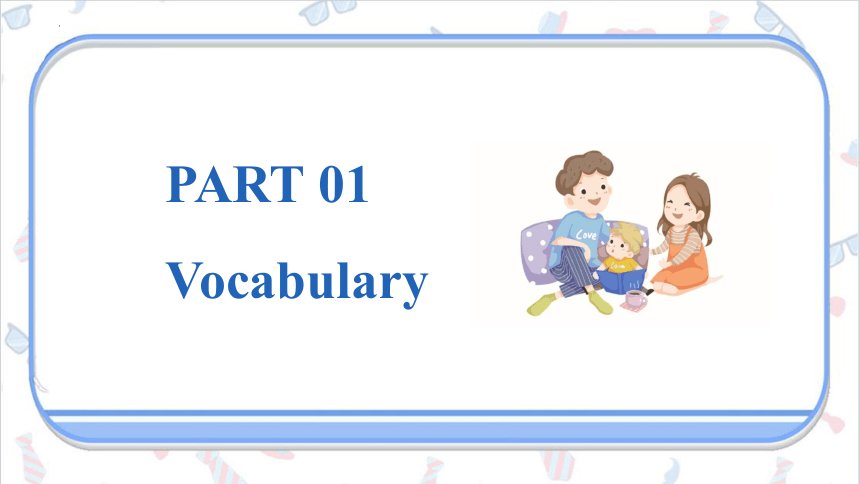
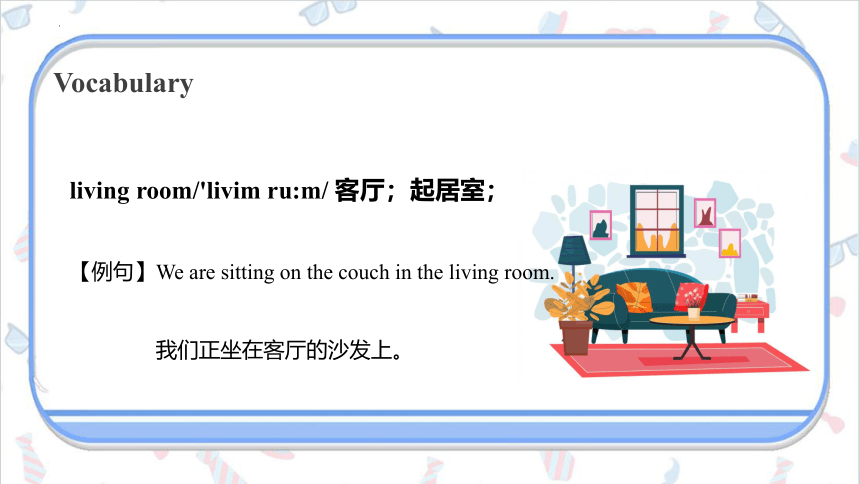





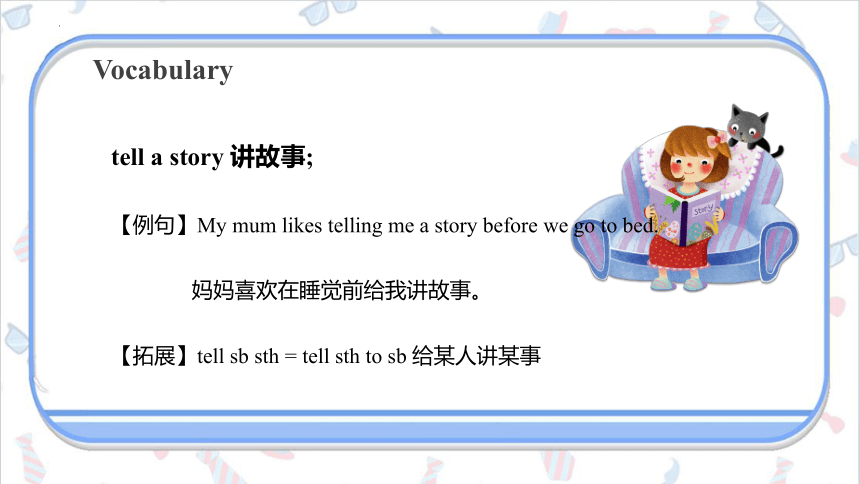
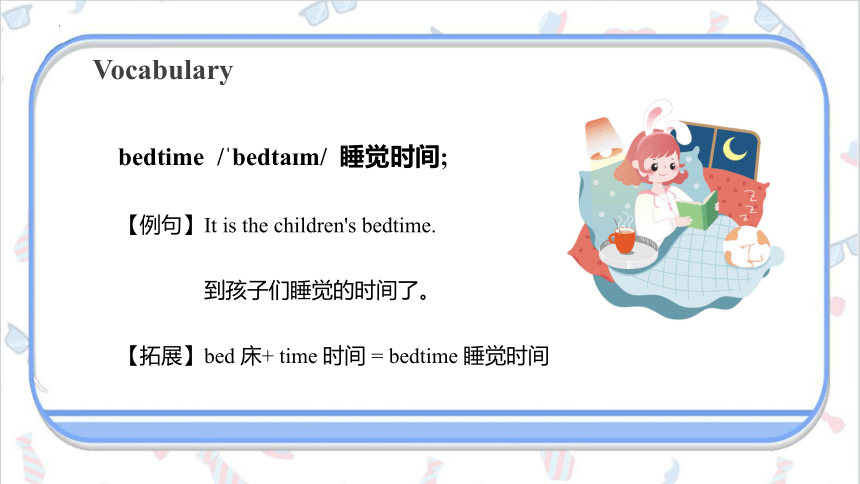
文档简介
(共85张PPT)
Module 2 Relationships
Unit 6 Family life
1.学习核心词汇:bedroom , living room, kitchen, bathroom,
their, light, watch TV, before
2.掌握br和cr的发音
3.重点的句型:I'm doing my homwork.Where are you I often...
4.动词-ing 形式的变化规律
5.掌握频率副词的意义和用法;
现在进行时的意义和用法
学习目标
Vocabulary
01
Grammar
03
Text
02
Practice
04
CONTENTS
PART 01
Vocabulary
Vocabulary
living room/'livim ru:m/ 客厅;起居室;
【例句】We are sitting on the couch in the living room.
我们正坐在客厅的沙发上。
Vocabulary
拓展:构词法记单词
live +room=livingroom roommate 室友
class+room=classroom 教室 mushroom 蘑菇waiting+room=waitingroom 候车室 dressingroom 更衣室
Vocabulary
bathroom / bɑ θru m; bɑ θr m/ 浴室;卫生间;
【例句】There's a bathroom and a lavatory upstairs.
楼上有浴室和卫生间。
【拓展】bath + room = bathroom 卫生间
bedroom/'bedru:m/ 卧室
【例句】I'm still afraid to sleep in my own bedroom.
我还是不敢在自己的卧室里睡觉。
【拓展】dining room 餐厅
storeroom 储藏间,储藏室
Vocabulary
Vocabulary
kitchen / k t n/ 厨房
【例句】She's in the kitchen.她在厨房里。
【拓展】 in the kitchen 在厨房里
单词拓展
bowl /b l/ 碗 spoon /spu:n/勺子
knife /naif/刀 pan /p n/平底锅
fork /f k/ 叉 peeler / pi l (r)/ 削皮器
Vocabulary
Vocabulary
tell a story 讲故事;
【例句】My mum likes telling me a story before we go to bed.
妈妈喜欢在睡觉前给我讲故事。
【拓展】tell sb sth = tell sth to sb 给某人讲某事
bedtime / bedta m/ 睡觉时间;
【例句】It is the children's bedtime.
到孩子们睡觉的时间了。
【拓展】bed 床+ time 时间 = bedtime 睡觉时间
Vocabulary
Vocabulary
light/lait/ 光;光线;光亮;
【例句】It is a light room with tall windows.
这间房有高大的窗子,光线充足。
【拓展】light 浅色 dark 深色
【反义词】当light作“轻的”讲时,反义词是heavy(重的)
watch TV /w t ,ti:'vi:/ 看电视
【例句】Do you always watch TV in the evening
你晚上总看电视吗?
【拓展】不同“看”的区别
look 通常表示主动地、有意识地“看”,侧重指看的行为;
see通常指看的客观结果,即“看见”;
watch也指有意识地看,但往往指仔细地盯着看事物的变化。
Vocabulary
Vocabulary
before /b f (r)/ 在…以前; (次序或排列) 在前面;
【例句】He arrived before me.他比我先到。
【拓展】before lunch午餐前 ; the day before yesterday 前天
【反义词】after 在…..之后
their / e (r)/ 他们的;她们的;它们的;
【例句】Which is their house 哪座房子是他们的?
【拓展】我们的 our;
你们的 your;
他的 his;
她的 her
Vocabulary
物主代词
第一人称单数 第二人称单数 第三人称单数 第一人称复数 第二人称复数 第三人称复数
形容词性物主代词 my your his; her; its our your their
名词性物主代词 mine yours his; hers; its ours yours theirs
释义 我的 你的 他的; 她的; 它的; 我们的 你们的 他们的;她们的;它们的;
Vocabulary
watch TV 看电视 before bedtime 睡觉之前 tell a story 讲故事
PART 02
Text
What is ___ doing in the ___
Listen and answer
Kitty is doing her homework in the living room .
do—>
What is Kitty doing in the ___
Ben is making a model plane in his bedroom.
make—>
What is Ben doing in the ___
wash—>
What is May doing in the ___
May is washing her hair in the bathroom.
Mr Li is cooking dinner
in the kitchen.
cook—>
What is Mr Li doing in the ___
Where are the Lis What are they doing Write and say.
Mr Li is in the kitchen. He's...
Where are the Lis What are they doing Write and say.
living room
kitchen
bathroom
bedroom
Say and act.
Good evening. It's Earth Hour now. Many people turn off their lights.
Hi, I'm Alice. I usually watch TV with my parents in the evening, but now we're looking at the stars.
Hello, my name's Kitty. My brother Ben and I usually read storybooks before bedtime, but now Grandma is telling us a story.
Sally: Hi, I'm Sally. I usually do my homework at night, but now I'm playing word games with my family.
Complete the reporter's notes.
Think and write
Think and write
Learn the sounds
Sing a song
PART 03
Grammar
1 询问对方所在的位置:
Where are you I am in the ___________.
Where is he/she He/she is in the _________.
Where are they They are in the __________.
2 询问对方正在做什么:
What are you doing
What is he/she doing
What are they doing
描述正在进行的动作或发生的事情
主语+be(am, is ,are)+V-ing :某人正在做某事
主语+be not+V-ing :某人没有正在做某事
I _________________ in the kitchen now.(cook)
She is not __________________TV now. (watch)
Look, the children _________________ in the library. (read)
4 一般现在时:表示经常或习惯性的动作
现在进行时:表示正在进行的动作
一般现在时 现在进行时
时间关键词 always, usually, often, sometimes, never, now now, look, listen
动词变化 I, you, we, they+动词原形 he, she, it+动词-s/es 直接加ing: do-doing, read-reading
去-e,加ing have-having, make-making
元+辅,双写最后一个字母
run-running, swim-swimming
例:1) I usually _________(read) books and _________(watch) TV with my parents.
2) Jill usually ____________ (play) chess after school.
3) In autumn, children often ________ (fly) kites in the park. Look! Some children
_________(fly) kites in the park now.
4) Mary usually _______________ (go)to the park with her grandparents, but now she ______________ (watch) TV with them.
区分:turn on开,turn off关,指打开/关上水龙头、电器等
如:Please turn off the light __________ you leave (离开) the bedroom.
A.before B. after C.behind
1. I'm doing my homework. 我正在做家庭作业。
解读:这是描述某人正在做某事的句型。
如:He is swimming in the river. 他正在河里游泳。
句式结构:be (am/is/are) +动词-ing
现在进行时
现在进行时表示现在正在进行的动作或存在的状态。
它表示动作发生的时间是“现在”,动作目前的状态是“正在进行中”
句式结构:be +动词ing形式
肯定句: 主语 + am/is/are +doing
否定句: 主语 + am/is/are+not+doing
一般疑问句: Am/Is/Are+主语+doing?
特殊疑问句: Where/ When/Why/What/How+-般疑问句?
现在进行时结构
现在进行时
现在进行时--肯定句
主语+ be动词+动词ing+其他.
例句:The cat is sleeping.
He ______ ________in his bedroom.
他正在卧室跳舞。
be动词包括: am, is, are.
口诀:I 用am, you用are。Is用于他(he),她(she),它(it)。
be动词用法口诀:
①一般直接在动词原形末尾加ing “直”
②以“不发音的e”、ue结尾的动词,先去e,再加ing “去”
③以重读闭音节结尾的动词,并且末尾只有一个辅音字母,应双写这一字母,再加ing “双”
④以ie结尾的动词,要改ie为y再加ing “改”
现在进行时用法
现在分词
变化规则
2. I often write e-mails to them.我经常给他们写电子邮件。
解读:这是描述某人写电子邮件的频率的句型。
如:I often cook dinner to my grandpa.
我经常给我的爷爷做晚饭。
always
usually
often
sometimes
never
总是,一直
通常
警察
有时
从不
What do you usually do with your family
I usually ____________ at night.
read storybooks do my homework
write and draw make a model plane
wash the dishes watch TV
tell stories wash my hair
take a walk ...
一般现在时
他经常骑自行车去学校。He usually goes to school by bike.
我们每天做早操。We do morning exercises every day.
一般现在时表示经常的、习惯性的动作或存在的状态。
常与频度的时间状语连用。
一般现在时时间标志
1.every week(day, year, month ...)系;
2.once/twice ... a week(day, year, month...)系;
3.often, usually, always, sometimes, never, seldom频率系;
4.on+某天;
5.其他不根据时间改变而改变的习惯规律和自然真理。
一般现在时用法
1.经常性或习惯性的动作,常与表示频度的时间状语连用
e.g. I go to school at 7 every morning.我每天早上7点去上学。
2.客观真理, 客观存在, 科学事实
e.g. The earth moves around the sun.地球绕着太阳转。
3.用在格言或警句中
e.g. Pride goes before a fall.骄者必败。
4.现在时刻的状态、能力、性格、个性
e.g. Xiao Wang writes good English but does not speak well.
小王的英语书面表达能力好,但口语不好。
一般现在时用法
1.肯定句:主语+ be动词+其他. I am a student.
2.否定句:主语+ be动词+ not+其他. I am not a student.
3.一般疑问句:be动词+主语+其他 -Are you ready -Yes, I am. / No, I'm not.
回答: Yes,主语+ be动词.
No,主语+ be动词+ not.
一般现在时的句型
1.肯定句:主语+动词原形/第三人称单数动词+其他.
2.否定句:主语+ don't/doesn't +动词原形+其他.
3.一般疑问句:Do/Does+主语+动词原形+其他
肯定回答: Yes,主语+ do/does.
否定回答: No,主语+don't/doesn't.
一般现在时的句型
I teach English.
Miss White teaches English.
I don't teach English.
She doesn't teach English.
Do you/Does Miss White teach English
人称 第一人称 第二人称 第三人称 数 单数 复数 单数 复数 单数 复数 单数 复数
主格 I we you you he she it they
宾格 me us you you him her it them
中文 我 我们 你 你们 他 她 它 他/她/它们
主语为单数第三人称的一般现在时
第三人称单数是语言中对话双方外其它某一个人。(简称三单)
人称代词 he, she, it
this / that / the/ an/a +单数名 orange, apple, book
单个人名、地名、称呼 Jack, China, Uncle Wang
不可数名词 bread, milk, water
主语为单数第三人称的一般现在时
单三人称的
主语可以是:
I do my homework every day.
He does his homework every day.
tips:主语为第三人称单数时,谓语动词要用三单。
三单变化
动词第三人称单数形式
规则 动词原形 第三人称单数形式
一般在动词词尾加 s play sing plays
sings
以ch,sh,s,x,o结尾的动词加 es teach wash go teaches
washes
goes
以辅音字母加y结尾的动词,先变y为i,再加 es cry study cries
studies
PART 04
Sentences
1.Kitty, where are you 凯蒂,你在哪里?
I’m in the living room. I’m doing my homework.
我在客厅。我在做作业。
2.Ben, where are you 本,你在哪里?
I’m in my bedroom. I’m making a model plane.
我在我的卧室。我正在做一个飞机模型。
3.Where are you, May Are you in the kitchen 梅,你在哪里?你在厨房吗?
No. I’m in the bathroom. I’m washing my hair.
不,我在浴室里。我在洗头发。
4.Dad, where are you 爸爸,你在哪里?
I’m in the kitchen. I’m cooking e and help me, please.
我在厨房。我在做晚饭。请过来帮帮我。
1.Good evening. It’s Earth Hour now.
晚上好。现在是地球一小时。
Many people turn off their lights.
很多人熄灯。
2.Hi, I’m Alice. I usually watch TV with my parents in the evening, but now we’re looking at the stars.
嗨,我是爱丽丝。我晚上通常和我父母看电视,但现在我们正在看星星。
3.Hello, my name’s Kitty. 你好,我的名字叫凯蒂。
My brother Ben answer I usually read storybooks before bedtime, but now Grandma is telling us a story.
我和我弟弟本通常在睡前读故事书,但现在奶奶正给我们讲故事。
4.Hi, I’m Sally. I usually do my homework at night, but now I’m playing word games with my family.
嗨,我是莎莉。我通常在晚上写作业,但现在我在和我的家人玩文字游戏。
London Bridge is falling down 伦敦桥要塌下来
London bridge is falling down, 伦敦桥要塌了,
falling down, falling down. 要塌了,要塌了
London bridge is falling down, 伦敦桥要塌了,
my fair lady. 我美丽的淑女
br/br/ -bread cr/kr/ – ice cream
Brian likes ice cream. He likes bread too.
布莱恩喜欢吃冰激凌。他还喜欢吃面包。
He puts some ice cream on the bread,
他把一些冰激凌抹在面包上,
And eats the ice cream with the bread.
接着吃冰激凌和面包。
PART 05
Practice
语音判断。判断下列各组划线部分的发音相同的打(√)发音不同的打(×)
( ) 1. A. drive B. dress C. driver
( ) 2. A. stand B. first C. stop
( ) 3. A. eat B. heavy C. sea
( ) 4. A. wash B. dish C. wish
选择填空。从每小题的三个选项中选出最佳选项。
( ) 1. I am a doctor. I can______.
A. cook B. drive a taxi C. help people
( ) 2. I’m good at______. I want to be a lifeguard
A. swimming B. singing C. flying
( ) 3. Joe and Peter are good friends. They are in ______class.
A. different B. the same C. same
( ) 4. Mary ______ to school by bus. I ______to school on foot.
A. come, comes B. comes, comes C. comes, come
( ) 5. I live ______from school. I go to school by bus.
A. far B. near C. for
( ) 6. My mother’s birthday is______26th October.
A. at B. in C. on
( ) 7. I often play table tennis ______my grandparents.
A. in B. with C. to
( ) 8.You ______ a dog and Tim ______a cat.
A. have, have B. has, have C. has, have
( ) 9. Kitty and Alice are friends. They ______like sport.
A. both B. all C. too
( ) 10. What are you doing I am ______ hands.
A. wash B. washing C. doing
判断下列句子是否与短文相符,相符的写A,不相符的写B。
Ben and Ted are good friends. They always play together.
One day, Ted sees a water gun (枪) in Ben’s hand, and he asks, “Who gave you the gun?”
“My grandma,”Ben says,“and this is the best (最好的) present I’ve ever (曾经) had.”
“Why ” Ted asks.
“When I play with it, I get everything (所有东西) wet. So my mom gives me $five dollars for not playing it. ” Ben answers.
判断下列句子是否与短文相符,相符的写A,不相符的写B。
( ) 1. Ted sees a fire gun in Ben’s hand.
( ) 2. Ben tells Ted that the water gun is the best present.
( ) 3. When Ben plays with the water gun, everything gets wet.
( ) 4. Ben’s mother gives Ben ten dollars for not playing with his water gun.
( ) 5. Ben likes the water gun because it’s pretty.
从所给出的句子中选出合适的选项完成对话,把编号写在横线上。
A:___________ B: No, I don't.
A: Why don't you often visit them They are old now.
B:____________ You know it's far from China.
A: Oh. Do you often call them and have a talk on the phone
B: No, I don't. ___________
A: That's good. Do you miss them
B: Of course! So I hope summer holiday comes soon.
A. What do you do with your grandparents then
B. But I often write emails to them.
C. Do you often visit your grandparents, Peter
D. My grandpa is good at fishing.
E. They live in the UK.
从所给出的句子中选出合适的选项完成对话,把编号写在横线上。
A: So you go back to the UK for summer holiday. B: Yes.
A: ___________
B: We usually go for a walk in the park. Sometimes we go fishing in the lake.
A: Do you always catch fish
B: Sure. _______________.
A: That sounds interesting.
A. What do you do with your grandparents then
B. But I often write emails to them.
C. Do you often visit your grandparents, Peter
D. My grandpa is good at fishing.
E. They live in the UK.
选出适当的短语,完成对话。
A. each other B. turn on C. play chess D. take...to F mads booke
( )1.--The dog Coco runs to the bus stop. What is she going to do
--She is going to _______ Mary and John _______ Grandma's home.
( )2.--How to be a good friend What's your idea, Ms. Guo
--I think good friends should like and help __________.
( )3.--What does Oliver do
-- He ______ some ______ at home. But the books are not interesting.
选出适当的短语,完成对话。
A. each other B. turn on C. play chess D. take...to F. mads booke
( )4.--What do you usually do with your grandparents
-- I usually _________ with my grandpa.
( )5.--It's dark here. Can you _______________ the lights
--OK, Mum.
Thank you!
Module 2 Relationships
Unit 6 Family life
1.学习核心词汇:bedroom , living room, kitchen, bathroom,
their, light, watch TV, before
2.掌握br和cr的发音
3.重点的句型:I'm doing my homwork.Where are you I often...
4.动词-ing 形式的变化规律
5.掌握频率副词的意义和用法;
现在进行时的意义和用法
学习目标
Vocabulary
01
Grammar
03
Text
02
Practice
04
CONTENTS
PART 01
Vocabulary
Vocabulary
living room/'livim ru:m/ 客厅;起居室;
【例句】We are sitting on the couch in the living room.
我们正坐在客厅的沙发上。
Vocabulary
拓展:构词法记单词
live +room=livingroom roommate 室友
class+room=classroom 教室 mushroom 蘑菇waiting+room=waitingroom 候车室 dressingroom 更衣室
Vocabulary
bathroom / bɑ θru m; bɑ θr m/ 浴室;卫生间;
【例句】There's a bathroom and a lavatory upstairs.
楼上有浴室和卫生间。
【拓展】bath + room = bathroom 卫生间
bedroom/'bedru:m/ 卧室
【例句】I'm still afraid to sleep in my own bedroom.
我还是不敢在自己的卧室里睡觉。
【拓展】dining room 餐厅
storeroom 储藏间,储藏室
Vocabulary
Vocabulary
kitchen / k t n/ 厨房
【例句】She's in the kitchen.她在厨房里。
【拓展】 in the kitchen 在厨房里
单词拓展
bowl /b l/ 碗 spoon /spu:n/勺子
knife /naif/刀 pan /p n/平底锅
fork /f k/ 叉 peeler / pi l (r)/ 削皮器
Vocabulary
Vocabulary
tell a story 讲故事;
【例句】My mum likes telling me a story before we go to bed.
妈妈喜欢在睡觉前给我讲故事。
【拓展】tell sb sth = tell sth to sb 给某人讲某事
bedtime / bedta m/ 睡觉时间;
【例句】It is the children's bedtime.
到孩子们睡觉的时间了。
【拓展】bed 床+ time 时间 = bedtime 睡觉时间
Vocabulary
Vocabulary
light/lait/ 光;光线;光亮;
【例句】It is a light room with tall windows.
这间房有高大的窗子,光线充足。
【拓展】light 浅色 dark 深色
【反义词】当light作“轻的”讲时,反义词是heavy(重的)
watch TV /w t ,ti:'vi:/ 看电视
【例句】Do you always watch TV in the evening
你晚上总看电视吗?
【拓展】不同“看”的区别
look 通常表示主动地、有意识地“看”,侧重指看的行为;
see通常指看的客观结果,即“看见”;
watch也指有意识地看,但往往指仔细地盯着看事物的变化。
Vocabulary
Vocabulary
before /b f (r)/ 在…以前; (次序或排列) 在前面;
【例句】He arrived before me.他比我先到。
【拓展】before lunch午餐前 ; the day before yesterday 前天
【反义词】after 在…..之后
their / e (r)/ 他们的;她们的;它们的;
【例句】Which is their house 哪座房子是他们的?
【拓展】我们的 our;
你们的 your;
他的 his;
她的 her
Vocabulary
物主代词
第一人称单数 第二人称单数 第三人称单数 第一人称复数 第二人称复数 第三人称复数
形容词性物主代词 my your his; her; its our your their
名词性物主代词 mine yours his; hers; its ours yours theirs
释义 我的 你的 他的; 她的; 它的; 我们的 你们的 他们的;她们的;它们的;
Vocabulary
watch TV 看电视 before bedtime 睡觉之前 tell a story 讲故事
PART 02
Text
What is ___ doing in the ___
Listen and answer
Kitty is doing her homework in the living room .
do—>
What is Kitty doing in the ___
Ben is making a model plane in his bedroom.
make—>
What is Ben doing in the ___
wash—>
What is May doing in the ___
May is washing her hair in the bathroom.
Mr Li is cooking dinner
in the kitchen.
cook—>
What is Mr Li doing in the ___
Where are the Lis What are they doing Write and say.
Mr Li is in the kitchen. He's...
Where are the Lis What are they doing Write and say.
living room
kitchen
bathroom
bedroom
Say and act.
Good evening. It's Earth Hour now. Many people turn off their lights.
Hi, I'm Alice. I usually watch TV with my parents in the evening, but now we're looking at the stars.
Hello, my name's Kitty. My brother Ben and I usually read storybooks before bedtime, but now Grandma is telling us a story.
Sally: Hi, I'm Sally. I usually do my homework at night, but now I'm playing word games with my family.
Complete the reporter's notes.
Think and write
Think and write
Learn the sounds
Sing a song
PART 03
Grammar
1 询问对方所在的位置:
Where are you I am in the ___________.
Where is he/she He/she is in the _________.
Where are they They are in the __________.
2 询问对方正在做什么:
What are you doing
What is he/she doing
What are they doing
描述正在进行的动作或发生的事情
主语+be(am, is ,are)+V-ing :某人正在做某事
主语+be not+V-ing :某人没有正在做某事
I _________________ in the kitchen now.(cook)
She is not __________________TV now. (watch)
Look, the children _________________ in the library. (read)
4 一般现在时:表示经常或习惯性的动作
现在进行时:表示正在进行的动作
一般现在时 现在进行时
时间关键词 always, usually, often, sometimes, never, now now, look, listen
动词变化 I, you, we, they+动词原形 he, she, it+动词-s/es 直接加ing: do-doing, read-reading
去-e,加ing have-having, make-making
元+辅,双写最后一个字母
run-running, swim-swimming
例:1) I usually _________(read) books and _________(watch) TV with my parents.
2) Jill usually ____________ (play) chess after school.
3) In autumn, children often ________ (fly) kites in the park. Look! Some children
_________(fly) kites in the park now.
4) Mary usually _______________ (go)to the park with her grandparents, but now she ______________ (watch) TV with them.
区分:turn on开,turn off关,指打开/关上水龙头、电器等
如:Please turn off the light __________ you leave (离开) the bedroom.
A.before B. after C.behind
1. I'm doing my homework. 我正在做家庭作业。
解读:这是描述某人正在做某事的句型。
如:He is swimming in the river. 他正在河里游泳。
句式结构:be (am/is/are) +动词-ing
现在进行时
现在进行时表示现在正在进行的动作或存在的状态。
它表示动作发生的时间是“现在”,动作目前的状态是“正在进行中”
句式结构:be +动词ing形式
肯定句: 主语 + am/is/are +doing
否定句: 主语 + am/is/are+not+doing
一般疑问句: Am/Is/Are+主语+doing?
特殊疑问句: Where/ When/Why/What/How+-般疑问句?
现在进行时结构
现在进行时
现在进行时--肯定句
主语+ be动词+动词ing+其他.
例句:The cat is sleeping.
He ______ ________in his bedroom.
他正在卧室跳舞。
be动词包括: am, is, are.
口诀:I 用am, you用are。Is用于他(he),她(she),它(it)。
be动词用法口诀:
①一般直接在动词原形末尾加ing “直”
②以“不发音的e”、ue结尾的动词,先去e,再加ing “去”
③以重读闭音节结尾的动词,并且末尾只有一个辅音字母,应双写这一字母,再加ing “双”
④以ie结尾的动词,要改ie为y再加ing “改”
现在进行时用法
现在分词
变化规则
2. I often write e-mails to them.我经常给他们写电子邮件。
解读:这是描述某人写电子邮件的频率的句型。
如:I often cook dinner to my grandpa.
我经常给我的爷爷做晚饭。
always
usually
often
sometimes
never
总是,一直
通常
警察
有时
从不
What do you usually do with your family
I usually ____________ at night.
read storybooks do my homework
write and draw make a model plane
wash the dishes watch TV
tell stories wash my hair
take a walk ...
一般现在时
他经常骑自行车去学校。He usually goes to school by bike.
我们每天做早操。We do morning exercises every day.
一般现在时表示经常的、习惯性的动作或存在的状态。
常与频度的时间状语连用。
一般现在时时间标志
1.every week(day, year, month ...)系;
2.once/twice ... a week(day, year, month...)系;
3.often, usually, always, sometimes, never, seldom频率系;
4.on+某天;
5.其他不根据时间改变而改变的习惯规律和自然真理。
一般现在时用法
1.经常性或习惯性的动作,常与表示频度的时间状语连用
e.g. I go to school at 7 every morning.我每天早上7点去上学。
2.客观真理, 客观存在, 科学事实
e.g. The earth moves around the sun.地球绕着太阳转。
3.用在格言或警句中
e.g. Pride goes before a fall.骄者必败。
4.现在时刻的状态、能力、性格、个性
e.g. Xiao Wang writes good English but does not speak well.
小王的英语书面表达能力好,但口语不好。
一般现在时用法
1.肯定句:主语+ be动词+其他. I am a student.
2.否定句:主语+ be动词+ not+其他. I am not a student.
3.一般疑问句:be动词+主语+其他 -Are you ready -Yes, I am. / No, I'm not.
回答: Yes,主语+ be动词.
No,主语+ be动词+ not.
一般现在时的句型
1.肯定句:主语+动词原形/第三人称单数动词+其他.
2.否定句:主语+ don't/doesn't +动词原形+其他.
3.一般疑问句:Do/Does+主语+动词原形+其他
肯定回答: Yes,主语+ do/does.
否定回答: No,主语+don't/doesn't.
一般现在时的句型
I teach English.
Miss White teaches English.
I don't teach English.
She doesn't teach English.
Do you/Does Miss White teach English
人称 第一人称 第二人称 第三人称 数 单数 复数 单数 复数 单数 复数 单数 复数
主格 I we you you he she it they
宾格 me us you you him her it them
中文 我 我们 你 你们 他 她 它 他/她/它们
主语为单数第三人称的一般现在时
第三人称单数是语言中对话双方外其它某一个人。(简称三单)
人称代词 he, she, it
this / that / the/ an/a +单数名 orange, apple, book
单个人名、地名、称呼 Jack, China, Uncle Wang
不可数名词 bread, milk, water
主语为单数第三人称的一般现在时
单三人称的
主语可以是:
I do my homework every day.
He does his homework every day.
tips:主语为第三人称单数时,谓语动词要用三单。
三单变化
动词第三人称单数形式
规则 动词原形 第三人称单数形式
一般在动词词尾加 s play sing plays
sings
以ch,sh,s,x,o结尾的动词加 es teach wash go teaches
washes
goes
以辅音字母加y结尾的动词,先变y为i,再加 es cry study cries
studies
PART 04
Sentences
1.Kitty, where are you 凯蒂,你在哪里?
I’m in the living room. I’m doing my homework.
我在客厅。我在做作业。
2.Ben, where are you 本,你在哪里?
I’m in my bedroom. I’m making a model plane.
我在我的卧室。我正在做一个飞机模型。
3.Where are you, May Are you in the kitchen 梅,你在哪里?你在厨房吗?
No. I’m in the bathroom. I’m washing my hair.
不,我在浴室里。我在洗头发。
4.Dad, where are you 爸爸,你在哪里?
I’m in the kitchen. I’m cooking e and help me, please.
我在厨房。我在做晚饭。请过来帮帮我。
1.Good evening. It’s Earth Hour now.
晚上好。现在是地球一小时。
Many people turn off their lights.
很多人熄灯。
2.Hi, I’m Alice. I usually watch TV with my parents in the evening, but now we’re looking at the stars.
嗨,我是爱丽丝。我晚上通常和我父母看电视,但现在我们正在看星星。
3.Hello, my name’s Kitty. 你好,我的名字叫凯蒂。
My brother Ben answer I usually read storybooks before bedtime, but now Grandma is telling us a story.
我和我弟弟本通常在睡前读故事书,但现在奶奶正给我们讲故事。
4.Hi, I’m Sally. I usually do my homework at night, but now I’m playing word games with my family.
嗨,我是莎莉。我通常在晚上写作业,但现在我在和我的家人玩文字游戏。
London Bridge is falling down 伦敦桥要塌下来
London bridge is falling down, 伦敦桥要塌了,
falling down, falling down. 要塌了,要塌了
London bridge is falling down, 伦敦桥要塌了,
my fair lady. 我美丽的淑女
br/br/ -bread cr/kr/ – ice cream
Brian likes ice cream. He likes bread too.
布莱恩喜欢吃冰激凌。他还喜欢吃面包。
He puts some ice cream on the bread,
他把一些冰激凌抹在面包上,
And eats the ice cream with the bread.
接着吃冰激凌和面包。
PART 05
Practice
语音判断。判断下列各组划线部分的发音相同的打(√)发音不同的打(×)
( ) 1. A. drive B. dress C. driver
( ) 2. A. stand B. first C. stop
( ) 3. A. eat B. heavy C. sea
( ) 4. A. wash B. dish C. wish
选择填空。从每小题的三个选项中选出最佳选项。
( ) 1. I am a doctor. I can______.
A. cook B. drive a taxi C. help people
( ) 2. I’m good at______. I want to be a lifeguard
A. swimming B. singing C. flying
( ) 3. Joe and Peter are good friends. They are in ______class.
A. different B. the same C. same
( ) 4. Mary ______ to school by bus. I ______to school on foot.
A. come, comes B. comes, comes C. comes, come
( ) 5. I live ______from school. I go to school by bus.
A. far B. near C. for
( ) 6. My mother’s birthday is______26th October.
A. at B. in C. on
( ) 7. I often play table tennis ______my grandparents.
A. in B. with C. to
( ) 8.You ______ a dog and Tim ______a cat.
A. have, have B. has, have C. has, have
( ) 9. Kitty and Alice are friends. They ______like sport.
A. both B. all C. too
( ) 10. What are you doing I am ______ hands.
A. wash B. washing C. doing
判断下列句子是否与短文相符,相符的写A,不相符的写B。
Ben and Ted are good friends. They always play together.
One day, Ted sees a water gun (枪) in Ben’s hand, and he asks, “Who gave you the gun?”
“My grandma,”Ben says,“and this is the best (最好的) present I’ve ever (曾经) had.”
“Why ” Ted asks.
“When I play with it, I get everything (所有东西) wet. So my mom gives me $five dollars for not playing it. ” Ben answers.
判断下列句子是否与短文相符,相符的写A,不相符的写B。
( ) 1. Ted sees a fire gun in Ben’s hand.
( ) 2. Ben tells Ted that the water gun is the best present.
( ) 3. When Ben plays with the water gun, everything gets wet.
( ) 4. Ben’s mother gives Ben ten dollars for not playing with his water gun.
( ) 5. Ben likes the water gun because it’s pretty.
从所给出的句子中选出合适的选项完成对话,把编号写在横线上。
A:___________ B: No, I don't.
A: Why don't you often visit them They are old now.
B:____________ You know it's far from China.
A: Oh. Do you often call them and have a talk on the phone
B: No, I don't. ___________
A: That's good. Do you miss them
B: Of course! So I hope summer holiday comes soon.
A. What do you do with your grandparents then
B. But I often write emails to them.
C. Do you often visit your grandparents, Peter
D. My grandpa is good at fishing.
E. They live in the UK.
从所给出的句子中选出合适的选项完成对话,把编号写在横线上。
A: So you go back to the UK for summer holiday. B: Yes.
A: ___________
B: We usually go for a walk in the park. Sometimes we go fishing in the lake.
A: Do you always catch fish
B: Sure. _______________.
A: That sounds interesting.
A. What do you do with your grandparents then
B. But I often write emails to them.
C. Do you often visit your grandparents, Peter
D. My grandpa is good at fishing.
E. They live in the UK.
选出适当的短语,完成对话。
A. each other B. turn on C. play chess D. take...to F mads booke
( )1.--The dog Coco runs to the bus stop. What is she going to do
--She is going to _______ Mary and John _______ Grandma's home.
( )2.--How to be a good friend What's your idea, Ms. Guo
--I think good friends should like and help __________.
( )3.--What does Oliver do
-- He ______ some ______ at home. But the books are not interesting.
选出适当的短语,完成对话。
A. each other B. turn on C. play chess D. take...to F. mads booke
( )4.--What do you usually do with your grandparents
-- I usually _________ with my grandpa.
( )5.--It's dark here. Can you _______________ the lights
--OK, Mum.
Thank you!
同课章节目录
- Module 1 Getting to know each othe
- Unit 1 My future
- Unit 2 Going to school
- Unit 3 My birthday
- Module 2 Relationships
- Unit 4 Grandparents
- Unit 5 Friends
- Unit 6 Family life
- Module 3 Out and about
- Unit 7 At the beach
- Unit 8 An outing
- Unit 9 Around the city
- Module 4 The natural world
- Unit 10 Wind
- Unit 11 Water
- Unit 12 Fire
